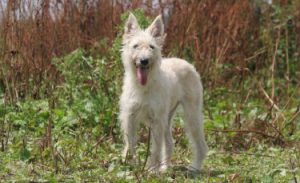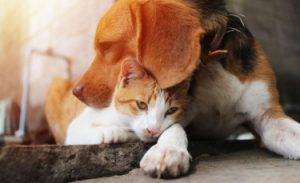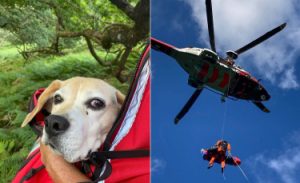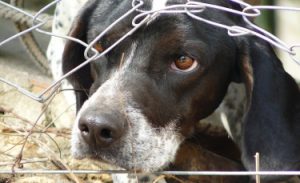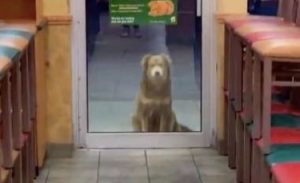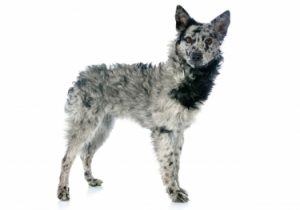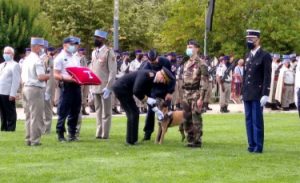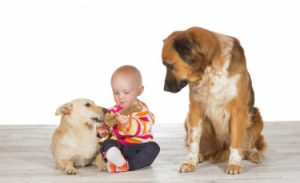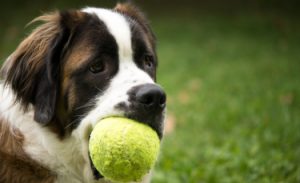Other name: Hungarian Shepherd Dog
The Komondor is a large dog, strongly built and of a robust constitution. It is covered with a long, felted and fluffy hair which constitutes, with its imposing size and its noble attitude, a whole characteristic of the aspect of the race.
<!–
–>
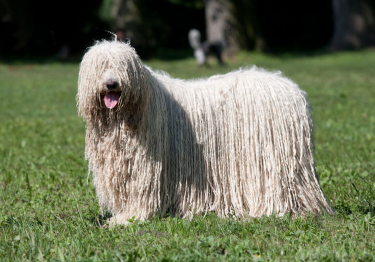
| Long | |
| Hungary | |
| Giant | |
| Round |
| Sex | Weight | Cut |
|---|---|---|
| Female | From 40 kg to 50 kg | From 60 cm to 70 cm |
| Male | From 50 kg to 60 kg | From 65 cm to 75 cm |
History of the breed
The origin of Komondor is very old . It is believed that his ancestors were already present in present-day Hungary alongside the nomadic Magyar shepherds who raised him for the care of their flocks of Racka sheep and their own defense. Popular in his country, he was nevertheless threatened during the Second World War , at the end of which his overall strength did not exceed a thousand.
Fortunately, enthusiasts of the breed, both in Hungary and abroad, have endeavored to maintain quality breeding. The Komondor breed was definitively recognized by the Fédération Cynologique Internationale (FCI) on August 9, 1954.
Physical features
His coat: long, rough, fluffy and felted, associated with a less thick undercoat. In some dogs, the outer coat is more dense and corded.
Its color: ivory only.
His head: broad, well proportioned to the body and covered with abundant hair. The skull is rounded, the stop well marked, the nose straight and black.
His ears: hang in a V or U shape, never raised, moderately high attachment.
His eyes: dark brown in color and placed horizontally.
His body: writable in a rectangle. The withers are accentuated on its front part, the back is short, the croup wide, of medium length and slightly sloping, and the chest strongly muscled.
Its tail: hanging, set low, slightly curved at its end, raised up to the height of the back line when the dog is awake.
Behavior and character
| Affectionate | |
|---|---|
| Calm | |
| Protective | |
| Independent | |
| Hunter | |
| Barks / howls |
Behavior with others
| Cohabitation with children | |
|---|---|
| Sociable with other animals | |
| Love strangers |
The Komondor is primarily a shepherd and guard dog . Vigilant, very observant and naturally extremely suspicious of strangers , he watches over and defends his master’s property with unwavering courage and determination. Very active at night, it is on the lookout for the slightest sign of intrusion. At home, he is very attached to his master and his family .
Education…
The Komondor must be educated in a firm and precocious manner. Otherwise, his physical strength and protective instinct can make him particularly difficult to deal with .
The Komondor
is it right for you? Take the test!
Education
| Clever | |
|---|---|
| Obedient |
Living conditions
| Suitable for apartment living | |
|---|---|
| Good for new masters | |
| Love it hot | |
| Love the cold |
The Komondor needs space and freedom of movement . He also and above all needs to express his instinct as a guardian . A house with a large fenced garden is therefore perfect for him. Living in an apartment suits him much less, even if he can adapt to an urban lifestyle if he is walked enough on a daily basis. The Komondor is not the kind of dog for a novice . Its management requires a minimum of experience and knowledge in dog breeding and education.
Health
| Solid | |
|---|---|
| Ease of gaining weight |
The long and supplied dress of the Komondor gives it excellent protection against cold and humidity . Of solid constitution, the race nevertheless presents predispositions to certain dermatological diseases (sebaceous cysts, dermatitis …) or ocular (entropion). Being a large dog, the Komondor is also one of the breeds affected by the risk of hip dysplasia . This last aspect should therefore be monitored very closely, especially in breeding subjects.
Hypoallergenic breed
No
Litter size
NC
To protect yourself from these risks and insure your companion in the event of health problems, Woopets recommends Komondor dog insurance .
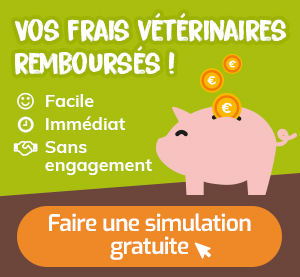
function showAssuranceForm () {var siteReferer = var id_race_association = ‘191’; //console.log(id_race_association);success: function (html) {}});}document.addEventListener (‘DOMContentLoaded’, () => {$ (‘# assuranceModalBanner’). on (‘show.bs.modal’, function (event) {showAssuranceForm ();});});
Life expectancy
The life expectancy of a Komondor is, on average, less than 0 years.
Calculate the human age of your Komondor!
To choose… 1 year 2 years 3 years Four years 5 years 6 years 7 years 8 years 9 years 10 years 11 years old 12 years 13 years 14 years old 15 years old 16 years old 17 years 18 years old 19 years old 20 years 21 years old
Maintenance and hygiene
| Ease of maintenance | |
|---|---|
| Cost of maintenance | |
| Hair loss |
| Drool level | |
|---|---|
| Ease of grooming |
The Komondor does not moult . Although long and abundant, her dress requires only basic maintenance, but regular .
Exits…
The Komondor needs long daily walks to meet their expectations of activity and exercise. He cannot be satisfied with simple outings of short duration.
Hygiene…
You don’t brush a Komondor. Its maintenance consists, from the age of 9 months, in separating the cords that form in its coat . An operation that most masters perform with their bare hands. The frequency of the baths to be given is, for its part, of the order of once or twice a year .
Price and budget
Purchase price
Mini
€ 1,200 Maxi
1600 €
The purchase price of a Komondor is between € 1,200 and € 1,600.
Annual maintenance cost
Mini
NC Maxi
NC
The annual maintenance cost of a Komondor is between NC and NC.
No name is currently proposed. Use our tool to find the name of your Komondor!
Want the best for your dog?
Create the tailor-made power supply for your Komondor
I discover !
PROMO -30% | Delivered to you!

Physical activity
| Athletic | |
|---|---|
| Energy level | |
| Potential to play |
Competitions
| Classifications & Standards |
|
Others
| Master character <span class="btnTooltip qTip2" title="- Calm: the master must be gentle and know how to show patience. – Active: the owner must be energetic and dynamic to live in harmony with his dog. – Hyperactive: the owner must be stimulating and very restless to suit the temperament of his dog.”> |
Calm |
|---|


